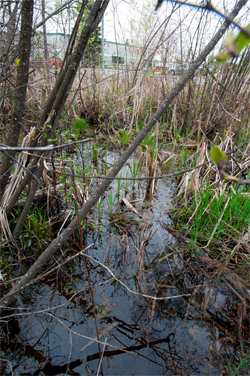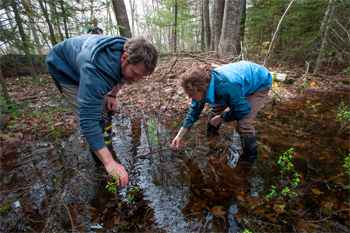Of Pools and People
Small natural features with large ecosystem functions in urbanizing landscapes
Institutions: University of Maine, Boston University, Bowdoin College
Sponsor: National Science Foundation (Coupled Natural Human Systems Program)
Project Website: Of Pools & People
 Many landscapes have small natural features that are far more important for maintaining biodiversity or providing ecosystem services than one would expect based on their size. Likewise, many landscapes are urbanizing as communities grow and their development patterns change. Effectively managing these features in urbanizing landscapes presents interesting challenges and opportunities. For example, their small size often means they can be conserved while allowing activities such as development, forestry, or agriculture to continue. Yet, prevailing conservation strategies are not fully taking advantage of these opportunities. Rather, they are undermined by limited scientific knowledge, especially of mechanisms linking ecological and social processes. In northeastern forests, vernal pools provide an excellent model system to study the dynamics of small natural feature management. Building on numerous ecological and economic theories, this project advances knowledge within and across the fields of ecology and economics by addressing two overarching goals: (1) explore the biophysical and socioeconomic components of vernal pool ecology and management as a coupled-systems model and (2) improve strategies for conserving vernal pools and other small natural features with large significance. The researchers will couple spatially explicit ecological and economic models within a dynamic system simulation model to examine the dynamic interactions between regulator, community, and landowner decision-making and the resulting landscape impacts on vernal pool species and broader scale ecosystem function. Findings from the simulation model will inform improved strategies for conserving natural resources.
Many landscapes have small natural features that are far more important for maintaining biodiversity or providing ecosystem services than one would expect based on their size. Likewise, many landscapes are urbanizing as communities grow and their development patterns change. Effectively managing these features in urbanizing landscapes presents interesting challenges and opportunities. For example, their small size often means they can be conserved while allowing activities such as development, forestry, or agriculture to continue. Yet, prevailing conservation strategies are not fully taking advantage of these opportunities. Rather, they are undermined by limited scientific knowledge, especially of mechanisms linking ecological and social processes. In northeastern forests, vernal pools provide an excellent model system to study the dynamics of small natural feature management. Building on numerous ecological and economic theories, this project advances knowledge within and across the fields of ecology and economics by addressing two overarching goals: (1) explore the biophysical and socioeconomic components of vernal pool ecology and management as a coupled-systems model and (2) improve strategies for conserving vernal pools and other small natural features with large significance. The researchers will couple spatially explicit ecological and economic models within a dynamic system simulation model to examine the dynamic interactions between regulator, community, and landowner decision-making and the resulting landscape impacts on vernal pool species and broader scale ecosystem function. Findings from the simulation model will inform improved strategies for conserving natural resources.
 This project provides the intellectual foundation for (1) advances in amphibian meta-population theory and microeconomic theories of land use and institutions and (2) a relatively novel approach to managing natural resources that extends far beyond vernal pools to analogous systems around the globe, from prairie potholes in mid-western North America to desert springs in southern Africa. By focusing on small natural features with disproportionate significance in urbanizing landscapes, the research will offer insights to help transform the way society approaches resource conservation, especially on private lands. Examining the merits of alternative management strategies, the researchers will provide stakeholders with more efficient and flexible management tools. The researchers will test these tools by supporting policy experiments on the ground in Maine. Sharing the experiences of Maine communities with communities throughout New England and eastern Canada and colleagues from around the globe will broaden the impact of these activities. This project will support and mentor high school, undergraduate, and graduate students, and early career to senior faculty in interdisciplinary research experiences. The research team includes five women in leadership positions, and will support in-service training of teachers from rural and Native American schools. Researchers will actively recruit Native American students, Maine’s largest underrepresented minority population. Project research will be integrated into multiple courses and bolster citizen-science programs. This project is supported by the NSF Dynamics of Coupled Natural and Human Systems (CNH) Program.
This project provides the intellectual foundation for (1) advances in amphibian meta-population theory and microeconomic theories of land use and institutions and (2) a relatively novel approach to managing natural resources that extends far beyond vernal pools to analogous systems around the globe, from prairie potholes in mid-western North America to desert springs in southern Africa. By focusing on small natural features with disproportionate significance in urbanizing landscapes, the research will offer insights to help transform the way society approaches resource conservation, especially on private lands. Examining the merits of alternative management strategies, the researchers will provide stakeholders with more efficient and flexible management tools. The researchers will test these tools by supporting policy experiments on the ground in Maine. Sharing the experiences of Maine communities with communities throughout New England and eastern Canada and colleagues from around the globe will broaden the impact of these activities. This project will support and mentor high school, undergraduate, and graduate students, and early career to senior faculty in interdisciplinary research experiences. The research team includes five women in leadership positions, and will support in-service training of teachers from rural and Native American schools. Researchers will actively recruit Native American students, Maine’s largest underrepresented minority population. Project research will be integrated into multiple courses and bolster citizen-science programs. This project is supported by the NSF Dynamics of Coupled Natural and Human Systems (CNH) Program.
Team Members
- Aram Calhoun, UMaine (team leader)
- Kathleen Bell, UMaine
- Mac Hunter, UMaine
- Michael Kinnison, UMaine
- Cynthia Loftin, USGS Maine Cooperative Fish and Wildlife Research Unit, UMaine
- Dana Bauer, Boston University
- Krista Capps, UMaine
- Erik Nelson, Bowdoin College
